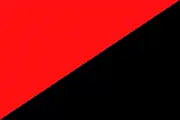Left-wing anarchism
Left-wing anarchism is an extreme kind of left-wing libertarianism. It is a kind of politics that believes capitalism and the government both need to be removed. These anarchists want to end private property because they believe people who own it have unfair power over others. They want a future based on people working to help each other, instead of for money. But they want to make these things happen without using a government. It wants a society where there is no one in charge. Each person does what they need to without others to lead them.[1][2] Left-wing anarchism often means the same as socialist anarchism and libertarian socialism.[3][4] Left-wing anarchists have been a part of anti-globalization protests. For example, the protest in 1999 against the World Trade Organization in Seattle.[5]
 | |
Anarchism Anarchists Anarcho-capitalism |
Other types of anarchism
Ulrike Heider, a syndicalist, grouped anarchism into left-wing anarchism, right-wing anarchism (anarcho-capitalism), and green anarchism.[6] People who study anarchists, including Bryan Caplan and Murray Bookchin, do not agree with her. They say her research was not good enough.[7][8] Left-wing anarchism is distinguished from free-market anarchism[9] and right-wing anarchism (such as that of Murray Rothbard).[10]
- Anarcho-capitalism is often not included as real anarchism. But it does combine capitalism with the belief in no government.
- Individualism and egoism can be types of anarchism.[11] These kinds of anarchists believe they should be totally free to do what they want, with no police or government to stop them.
- There is also a kind of anarchism called Post-leftism. It wants to rebel against left-wing politics from within left-wing ideas.
References
- Peacock, Adrian. 1999. Two Hundred Pharaohs, Five Billion Slaves. Ellipsis London
- Goodwin, Barbara. 2007. Using Political Ideas. John Wiley & Sons
- Brooks, Thom. (2002) Book Reviews. Journal of Applied Philosophy 19 (1), 75–90 doi:10.1111/1468-5930.00206
- Thagard, Paul. 2002. Coherence in Thought and Action. MIT Press. p. 153
- Rosser, John Barkley. 2004. Comparative Economics in Transforming World Economy. MIT Press. p. 63
- Heider, Ulrike. Anarchism: Left, Right and Green San Francisco: City Lights Books, 1994.
- Caplan, Bryan. "Factual Errors in Marshall and Heider". Retrieved 2008-03-08.
- Bookchin, Murray (Winter 1994). "A Meditation on Anarchist Ethics". The Raven: Anarchist Quarterly. 7 (4): 328–46. Retrieved 2008-03-08.
- Paul, Ellen Frankel. Miller, Fred Dycus. Paul, Jeffrey. 1993. (no title listed) Cambridge University Press. p. 115
- Chomsky, Noam. 2003. Chomsky on Democracy & Education. Routledge. p. 398
Chomsky, Noam. Language and Politics. AK Press. p. 153 - Leopold, David. "Max Stirner". In Edward N. Zalta (ed.). The Stanford Encyclopedia of Philosophy (Winter 2019 ed.).
Other websites
- Defining anarchism Archived 2008-06-15 at the Wayback Machine from An Anarchist FAQ, written by social anarchists
- Anarchist Theory FAQ, in which anarcho-capitalist Bryan Caplan argues that a broad division in anarchism exists between "left-anarchism" and anarcho-capitalism
- Anarchism: Two Kinds by Wendy McElroy, an individualist anarchist
- Collectivist-Anarchism and Communist-Anarchism from The Conquest of Power, by Albert Weisbord
- Canning Reactionary Leftism a criticism of left-anarchism by Keith Preston
- The Incredible Lameness of Left Anarchism Archived 2010-02-23 at the Wayback Machine by Jason McQuinn. A critique from a post-left anarchist perspective.
- Learning the Hard Way: My Life as an Anarcho-Leftoid by Keith Preston
